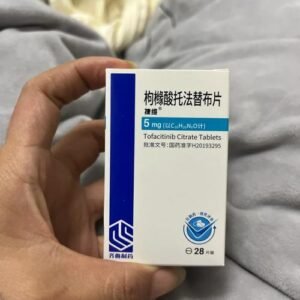Capmatinib 卡马替尼
Capmatinib is an oral MET inhibitor, mainly used to treat advanced or metastatic non-small cell lung cancer (NSCLC) with MET exon 14 skipping mutations. It inhibits tumor growth and spread by selectively inhibiting MET tyrosine kinase activity and blocking related signaling pathways. The drug needs to be used under the guidance of a doctor. Common side effects include edema, nausea, fatigue, etc. In severe cases, timely medical treatment is required to adjust the treatment plan.
Mechanism of Action and Indications
Mechanism of Action: Capmatinib inhibits MET protein (a receptor tyrosine kinase associated with tumor proliferation and metastasis), interferes with downstream signal transduction, and inhibits tumor cell growth.
Indications: It is suitable for patients with locally advanced or metastatic NSCLC who have been confirmed to have MET exon 14 skipping mutations by testing, usually as a second-line or later-line treatment option.
Precautions for Use
Gene Testing: Before taking the drug, tissue or blood tests are required to clarify the MET mutation status to ensure targeted treatment.
Dosage and Usage : The standard dose is taken orally twice a day, which needs to be adjusted according to the patient’s tolerance. Do not increase, decrease or stop the drug on your own.
Side Effect Management :
Common reactions : Peripheral edema, fatigue, loss of appetite, nausea (usually mild to moderate, which can be relieved by symptomatic treatment).
Serious risks : Interstitial lung disease, hepatotoxicity, allergic reactions (need to stop the drug immediately and seek medical attention).
Drug Interactions and Contraindications Interactions : Combined use with strong CYP3A4 inhibitors (such as clarithromycin) or inducers (such as rifampicin) may affect the efficacy of the drug, and the doctor should be informed of the drugs being used.
Contraindications : People who are allergic to the ingredients, those with severe liver and kidney dysfunction, pregnant or lactating women (contraceptive measures need to be taken).
Recommendations for use Follow doctor’s advice for monitoring : During treatment, liver function, blood routine and imaging should be checked regularly to evaluate the efficacy.
Medical Guidance : If symptoms such as dyspnea, persistent fever or jaundice occur, contact the doctor immediately to adjust the plan.
Capmatinib is a prescription drug, and patients must strictly follow the doctor’s instructions to ensure the safety and effectiveness of treatment.
View more
Share:
Products
Our offers
Health Classification
Let us work together to protect precious health




























